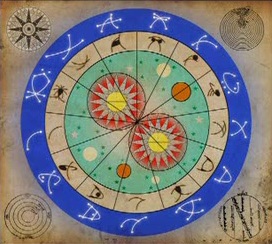Zodiac: Difference between revisions
m (stripping wikipediainfo in preparation for moving all to the top of the page) |
m (Adding back wikipediainfo, but at the top of the page) |
||
| Line 1: | Line 1: | ||
{{wikipediainfo}} | |||
{{you may|Short Trips: Zodiac|n1=the anthology ''Short Trips: Zodiac''}} | {{you may|Short Trips: Zodiac|n1=the anthology ''Short Trips: Zodiac''}} | ||
{{first pic|Ventiplex zodiac.jpg|The Zodiac of the planet [[Ventiplex]]}} | {{first pic|Ventiplex zodiac.jpg|The Zodiac of the planet [[Ventiplex]]}} | ||
Revision as of 09:49, 13 December 2014
- You may be looking for the anthology Short Trips: Zodiac.

The Zodiac formed an integral part of astrology on the many planets where sentient beings practised this art. It resembled a wheel, with beings of different birthdates having a different place on that wheel depending on the influence of the stars and/or planets. Humans and Draconians each used Zodiac signs in their astrology, as did the inhabitants of the planet Ventiplex. (TV: Secrets of the Stars)
According to the Fourth Doctor, the last sign of the Zodiac was Pisces. (AUDIO: Doctor Who and the Pescatons) The Second Doctor mentioned Aquarius, Aries, Taurus and Gemini while pretending to use astrological criteria as a physician. (TV: The Highlanders)
Behind the scenes
- Short Trips: Zodiac, edited by Jacqueline Rayner, arranges its stories on a Zodiac theme.
